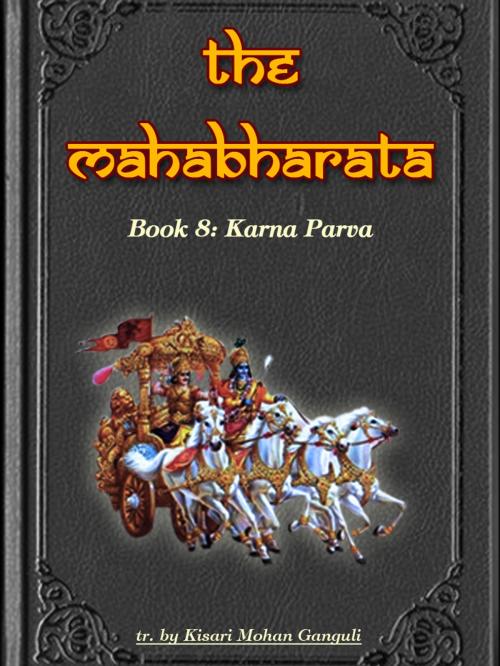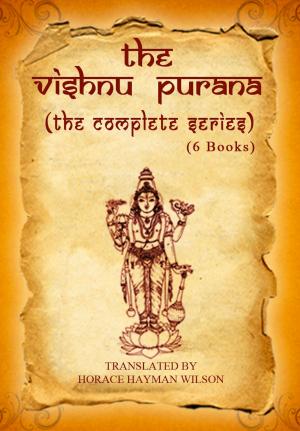The Mahabharata, Book 8: Karna Parva
Nonfiction, Religion & Spirituality, Eastern Religions, Hinduism, Inspiration & Meditation, Spirituality, History| Author: | Kisari Mohan Ganguli | ISBN: | 1230000036151 |
| Publisher: | AppsPublisher | Publication: | December 3, 2012 |
| Imprint: | Language: | English |
| Author: | Kisari Mohan Ganguli |
| ISBN: | 1230000036151 |
| Publisher: | AppsPublisher |
| Publication: | December 3, 2012 |
| Imprint: | |
| Language: | English |
The Mahabharata, Book 8: Karna Parva
Kisari Mohan Ganguli, tr.
Om! Having bowed down to Narayana, and Nara the foremost of male beings, and the goddess Saraswati also, must the word Jaya be uttered.
It is of immense importance to the culture of the Indian subcontinent, and is a major text of Hinduism. Its discussion of human goals (artha or purpose, kama or pleasure, dharma or duty/harmony, and moksha or liberation) takes place in a long-standing tradition, attempting to explain the relationship of the individual to society and the world (the nature of the 'Self') and the workings of karma.
The object of a translator should ever be to hold the mirror upto his author. That being so, his chief duty is to represent so far as practicable the manner in which his author's ideas have been expressed, retaining if possible at the sacrifice of idiom and taste all the peculiarities of his author's imagery and of language as well. In regard to translations from the Sanskrit, nothing is easier than to dish up Hindu ideas, so as to make them agreeable to English taste. But the endeavour of the present translator has been to give in the following pages as literal a rendering as possible of the great work of Vyasa. To the purely English reader there is much in the following pages that will strike as ridiculous. Those unacquainted with any language but their own are generally very exclusive in matters of taste. Having no knowledge of models other than what they meet with in their own tongue, the standard they have formed of purity and taste in composition must necessarily be a narrow one. The translator, however, would ill-discharge his duty, if for the sake of avoiding ridicule, he sacrificed fidelity to the original. He must represent his author as he is, not as he should be to please the narrow taste of those entirely unacquainted with him. Mr. Pickford, in the preface to his English translation of the Mahavira Charita, ably defends a close adherence to the original even at the sacrifice of idiom and taste against the claims of what has been called 'Free Translation,' which means dressing the author in an outlandish garb to please those to whom he is introduced.
Vaishampayana said, "After Drona had been slain, O monarch, the royal warriors (of the Kaurava army) headed by Duryodhana, with hearts filled with great anxiety, all repaired to Drona's son. Lamenting the loss of Drona, and deprived of energy in consequence of their cheerlessness, they sat around the son of Sharadvata's daughter, afflicted with grief. Comforted for a little while by considerations founded upon the scriptures, when night came, those rulers of Earth proceeded to their respective tents. Those lords of Earth, however, O thou of Kuru's race, could feel no happiness in their abodes. Thinking of that immense slaughter, they could not also sleep. The Suta's son (Karna), and king Suyodhana and Duhshasana and Shakuni, in special, could not compose themselves to sleep. Those four passed that night together in Duryodhana's tent, reflecting upon the woes they had inflicted upon the high-souled Pandavas. Formerly they had brought Draupadi, plunged into woe on account of the match at dice, into the assembly. Recollecting it they experienced great regret, their hearts being filled with anxiety. Thinking of those sufferings inflicted (upon the Pandavas) in consequence of the gambling match they passed that night in sorrow, O king, as if it were really a hundred years. Then when morning came, observing the dictates of the ordinance, all of them duly went through the customary rites. Having gone through these customary rites, and comforted to some extent, O Bharata, they ordered their troops to be arrayed, and then came out for battle, having made Karna their generalissimo by tying the auspicious thread round his wrists, and having caused many foremost of brahmanas, by presents of vessels of curds, clarified butter, akshatas, coins of gold, kine, jewels and gems, and costly robes, to pray for their victory, and having caused heralds and musicians, and panegyrists to adore them with hymns about victory. The Pandavas also, O king, having gone through their morning rites, issued from their camp, resolved on battle. Then commenced a fierce battle, making the hair to stand on end, between the Kurus and the Pandavas, each desirous of vanquishing the other. During the commandership of Karna, the battle that took place between the Kuru and the Pandava troops was exceedingly fierce and lasted for two days. Then Vrisha (Karna) having made an immense slaughter of his enemies in battle, was at last slain in the sight of the Dhartarashtras, by Arjuna. Then Sanjaya, repairing to Hastinapura told Dhritarashtra all that had happened at Kurujangala."
The Mahabharata, Book 8: Karna Parva
Kisari Mohan Ganguli, tr.
Om! Having bowed down to Narayana, and Nara the foremost of male beings, and the goddess Saraswati also, must the word Jaya be uttered.
It is of immense importance to the culture of the Indian subcontinent, and is a major text of Hinduism. Its discussion of human goals (artha or purpose, kama or pleasure, dharma or duty/harmony, and moksha or liberation) takes place in a long-standing tradition, attempting to explain the relationship of the individual to society and the world (the nature of the 'Self') and the workings of karma.
The object of a translator should ever be to hold the mirror upto his author. That being so, his chief duty is to represent so far as practicable the manner in which his author's ideas have been expressed, retaining if possible at the sacrifice of idiom and taste all the peculiarities of his author's imagery and of language as well. In regard to translations from the Sanskrit, nothing is easier than to dish up Hindu ideas, so as to make them agreeable to English taste. But the endeavour of the present translator has been to give in the following pages as literal a rendering as possible of the great work of Vyasa. To the purely English reader there is much in the following pages that will strike as ridiculous. Those unacquainted with any language but their own are generally very exclusive in matters of taste. Having no knowledge of models other than what they meet with in their own tongue, the standard they have formed of purity and taste in composition must necessarily be a narrow one. The translator, however, would ill-discharge his duty, if for the sake of avoiding ridicule, he sacrificed fidelity to the original. He must represent his author as he is, not as he should be to please the narrow taste of those entirely unacquainted with him. Mr. Pickford, in the preface to his English translation of the Mahavira Charita, ably defends a close adherence to the original even at the sacrifice of idiom and taste against the claims of what has been called 'Free Translation,' which means dressing the author in an outlandish garb to please those to whom he is introduced.
Vaishampayana said, "After Drona had been slain, O monarch, the royal warriors (of the Kaurava army) headed by Duryodhana, with hearts filled with great anxiety, all repaired to Drona's son. Lamenting the loss of Drona, and deprived of energy in consequence of their cheerlessness, they sat around the son of Sharadvata's daughter, afflicted with grief. Comforted for a little while by considerations founded upon the scriptures, when night came, those rulers of Earth proceeded to their respective tents. Those lords of Earth, however, O thou of Kuru's race, could feel no happiness in their abodes. Thinking of that immense slaughter, they could not also sleep. The Suta's son (Karna), and king Suyodhana and Duhshasana and Shakuni, in special, could not compose themselves to sleep. Those four passed that night together in Duryodhana's tent, reflecting upon the woes they had inflicted upon the high-souled Pandavas. Formerly they had brought Draupadi, plunged into woe on account of the match at dice, into the assembly. Recollecting it they experienced great regret, their hearts being filled with anxiety. Thinking of those sufferings inflicted (upon the Pandavas) in consequence of the gambling match they passed that night in sorrow, O king, as if it were really a hundred years. Then when morning came, observing the dictates of the ordinance, all of them duly went through the customary rites. Having gone through these customary rites, and comforted to some extent, O Bharata, they ordered their troops to be arrayed, and then came out for battle, having made Karna their generalissimo by tying the auspicious thread round his wrists, and having caused many foremost of brahmanas, by presents of vessels of curds, clarified butter, akshatas, coins of gold, kine, jewels and gems, and costly robes, to pray for their victory, and having caused heralds and musicians, and panegyrists to adore them with hymns about victory. The Pandavas also, O king, having gone through their morning rites, issued from their camp, resolved on battle. Then commenced a fierce battle, making the hair to stand on end, between the Kurus and the Pandavas, each desirous of vanquishing the other. During the commandership of Karna, the battle that took place between the Kuru and the Pandava troops was exceedingly fierce and lasted for two days. Then Vrisha (Karna) having made an immense slaughter of his enemies in battle, was at last slain in the sight of the Dhartarashtras, by Arjuna. Then Sanjaya, repairing to Hastinapura told Dhritarashtra all that had happened at Kurujangala."















